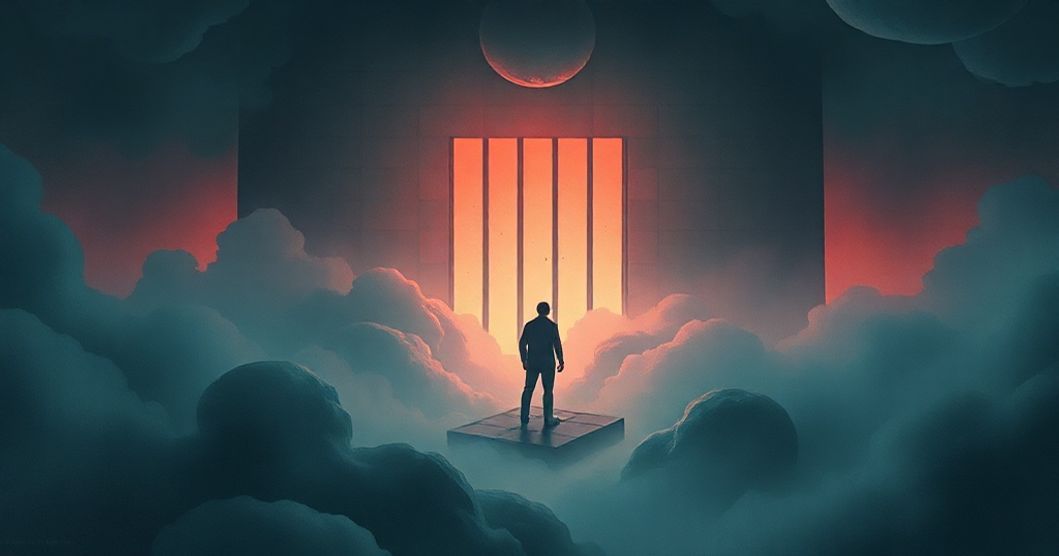Part 1: Dream Presentation
Dreams often serve as mirrors to our inner landscapes, reflecting tensions we may not yet name in waking life. This particular dream, with its visceral blend of childhood echoes and present-day anxiety, offers a compelling window into the unconscious mind’s way of processing emotional conflicts. Consider the dream narrative as it unfolds:
I found myself in a small dorm room, the clock showing 10:25 a.m.—a time that felt both familiar and disorienting. My roommate still hadn’t left, and the door was locked, a detail that triggered an immediate sense of confinement. I’d woken at 6:30 a.m., dizzy and craving rest, so I’d tucked my phone under the pillow and settled into bed, drawn by the cool draft from an open window that made the warm blanket feel even more comforting. Little did I know this nap would unravel into one of the most terrifying experiences I’d ever known, resurrecting childhood memories I’d long buried.
Seconds blurred into minutes as I drifted off, and when I next became aware, I was in a transformed space. The dorm room had expanded, its walls stretching into an unfamiliar expanse with three entrances: two ordinary doors and a saloon-style door leading to a corridor with a matching door. The air buzzed with chaos—loud, overlapping whispers that felt like a thousand voices speaking in tongues, interspersed with rapid beeping that rattled my ears. I stood frozen, disoriented, as figures materialized behind the doors, their voices rising in a crescendo. They called my name, and the collective demand to identify myself felt overwhelming, like a tidal wave of attention I couldn’t process.
Want a More Personalized Interpretation?
Get your own AI-powered dream analysis tailored specifically to your dream
🔮Try Dream Analysis FreeMy head spun, nausea creeping in. This wasn’t just a dream—it felt like torture. Then, a flicker of clarity: This is a dream, but I’m not in control. A childhood memory surfaced unbidden: similar dreams where I’d felt trapped, sounds assaulting me, the world warping into something unrecognizable. In that moment, I realized I was lucid dreaming—a rare gift, yet one that sparked new terror. I don’t want to be stuck here, I thought. The urge to wake myself overwhelmed me, but curiosity warred with laziness; after all, I’d napped to rest, not exert effort.
The scene shifted to the saloon door, where my roommate’s friend stood, partially visible from behind the door’s top edge. The crowd outside pressed against the wooden panels, hands clawing at the frame as if trying to force entry. I felt a surge of relief—it’s locked—but then the door began to creak, and I instinctively pressed my palm against it, trying to hold it shut. The panic escalated as bangs echoed through the room, growing louder with each strike. I woke briefly in reality, thinking the noise was from outside my dorm, only to fall back asleep and find the same relentless pounding echoing in my mind.
In another layer of the dream, I found myself on the floor, fumbling with keys to remove the lock, then collapsing back onto the bed. The chaos dimmed, leaving only insistent whispers in my ears—a persistent, ghostly hum. Finally, I entered a third room, lined with computers, where classmates moved about casually. It was a stark contrast to the preceding madness, yet the relief was fleeting.
When I woke for real, the room felt silent, but the dream’s intensity lingered. The whispers, the locked door, the overwhelming voices—they all returned, crystallizing into a fear I’d thought long forgotten. I couldn’t shake the feeling that this wasn’t just a random nightmare, but a message from somewhere deeper within.
Part 2: Clinical Analysis
Symbolic Landscape: Locked Doors and Overwhelming Sounds
The locked dorm room serves as a primary symbol of confinement and restriction, both literal and metaphorical. In dreams, doors often represent opportunities, boundaries, or emotional barriers. Here, the locked door suggests the dreamer feels trapped in a situation—perhaps academic pressure, social obligations, or an inability to escape daily responsibilities. The three entrances (two ordinary, one saloon-style) may symbolize different life paths or ways of dealing with challenges, but the saloon door’s distinctiveness hints at a more unconventional or overwhelming approach to confronting them.
The overwhelming sounds—the whispers, beeping, and collective voices—are particularly significant. Whispers in dreams often represent suppressed truths or unspoken anxieties, while the beeping could symbolize the dreamer’s internal
